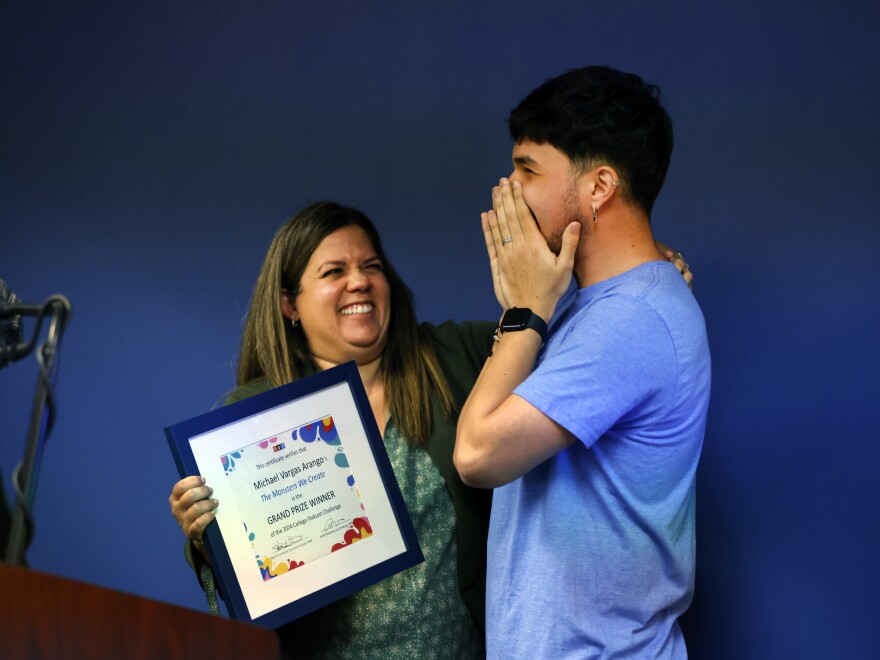It's rare to get a first-person perspective on living with a condition called schizoaffective disorder. But Michael Vargas Arango, who was diagnosed as a teenager, wanted the world to know that it's not something to be afraid of.
"I'm not dangerous. I'm not crazy. And I'm not delusional," he says in his podcast, The Monsters We Create. "I'm just one more guy, with a mental health condition, living with it."
His emotional and deeply personal entry was chosen by our judges, from among 10 finalists. As the grand prize winner of this year's NPR College Podcast Challenge, he'll receive a $5,000 scholarship.
The idea for his podcast came after Vargas Arango told his girlfriend, Elizabeth Pella, about his schizoaffective disorder.
"Of course I had to tell her this is happening to me: I hear voices. I feel presences," says the 22-year-old international student at Miami Dade College in Florida. "This is who I am. I can't lie. I cannot lie."
It was a big deal for him to tell her. He was living in a foreign city, speaking his second language, far from his family back in Colombia, and Pella would be the first person outside of his family he'd told.
The conversation went well, and Pella was understanding, curious, and loving. But she had one request: Don't tell my friends.
She says she was worried that they would judge him and even judge her. "'Like, why are you dating this guy?' I was scared," she says, "and I wanted to protect him, too."
"I'm gonna show you how it is."

Pella's request didn't sit well with Vargas Arango. "You don't wanna know?" he recalls thinking, "I'm gonna show you how it is."
Now, he didn't just want to tell his girlfriend and her friends. He wanted to show everyone what it was like living in his head.
Using his own voice, interviews and layers of sound design, he crafted the podcast that won NPR's competition.
Vargas Arango's podcast starts with an exchange between himself and the voice in his head: "Why would you tell them I exist? They won't understand."
He responds, "You're giving me a headache. Can you shut up for a second?"
Then, Vargas Arango addresses the listener: "This is how I've been living my whole life. But you're probably wondering: What is this guy talking about? Who is he even talking to? Well, let me explain."
He explores what it's like to live with schizoaffective disorder, a chronic mental health condition where a person experiences symptoms of schizophrenia, such as hallucinations or delusions, and mood disorders like depression. It's rare – Vargas Arango is among the 3 in 1,000 people who experience it.
"I hear voices but in another language that I just don't understand," he explains. "I sometimes hear my name being called multiple times."
Challenging misconceptions about schizoaffective disorder
Vargas Arango plays with sound effects and echoes in his podcast.
It's not always to illustrate his experience, he says. In some cases, it's a metaphor, where he uses distorted voice recordings as a "way to make fun of the prejudice that people have. Because they think that you're hearing these voices to try to go hurt someone," he says.
"That's not what I hear," he adds. "That's not how it works."
This openness is pretty radical for Vargas Arango. His family back in Colombia didn't really talk about mental health, and, as a kid, his schizoaffective disorder presented itself as "imaginary friends."

"You can probably imagine what the reaction of my Colombian religious mother was," he says in the podcast. "She thought I could see a ghost or something. But no, I can't see ghosts. Sadly."
The diagnosis came when he was a teenager, from visits to psychiatrists and psychologists. That was followed by dark times, which included depression, anxiety and suicidal thoughts as he struggled with his own preconceived notions around schizoaffective disorder and mental illness.
"I was one of those people that had this perspective of, 'these people are crazy, these people are dangerous, these people are delusional, you got to be away from them,'" he recalls.
Talking openly about his condition and his treatment – which includes medicine and therapy – and then winning the NPR contest has also helped his family, he says.
After NPR gave Vargas Arango the news, he calls his parents to tell them. Through tears, his mom, Olga Arango, tells him in Spanish that she's crying from joy, from happiness.
"She says she admires me," Vargas Arango translates.
His mom says hearing about his podcast and his success has changed her perception of mental illness: "I know that God gave me a really beautiful person, and everyday I tell him not to change."
Not changing, Michael says, is the biggest lesson he learned in telling his story. He says he's no longer scared to tell people who he really is.
"You need to be honest. You need to embrace who you are and what you're living with. Everyone's going through their own stuff."
Listen to Michael's podcast here.
If you or someone you know may be considering suicide, contact the 988 Suicide & Crisis Lifeline by dialing 9-8-8, or the Crisis Text Line by texting HOME to 741741.
Copyright 2025 NPR






